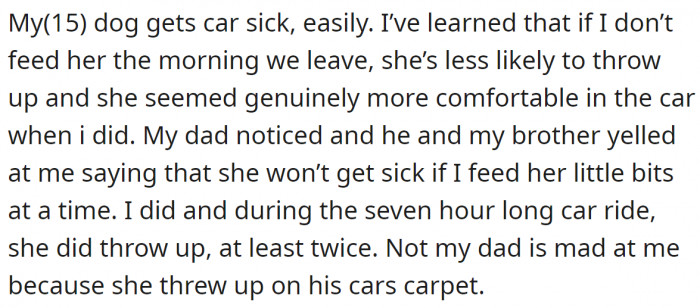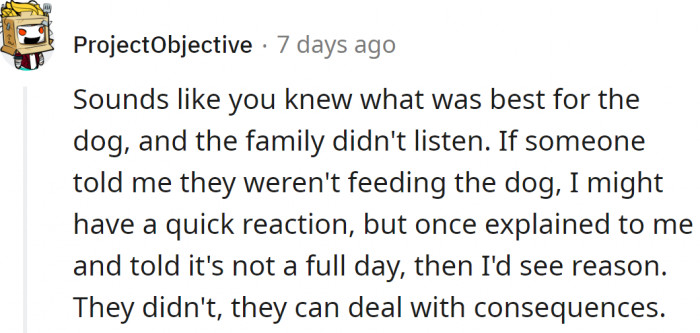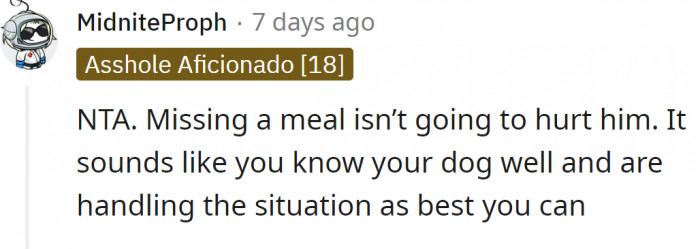Redditor Asks If They Were Right For Not Feeding Their Carsick-Prone Dog During A Long Trip Despite Their Family’s Instructions
Having a dog is like having a baby. You know the basics about how to take care of that little creature, but over time you discover and learn its needs and reactions, so your care for it can become absolutely complete.
Every caring dog owner tends to discover and learn this as soon as possible so that their dog will be satisfied and happy. Once you realize your dog's needs, no one can teach you what you should or shouldn't do about it.
You know your dog best, so you can make the best decision for them. Unfortunately, people will always find something to say, whether they are right or wrong.
They will force their opinions and even judge you if you don't follow their advice and do as they think you should. Something similar happened to a Reddit user recently, and he shared his story online.
He learned that his dog gets carsick if she eats before the trip, so he stopped feeding her before the car ride. This way, the dog enjoys the car ride and doesn't throw up along the way.
But the last time they went on a trip, the Redditor's brother and dad noticed that he didn't feed his dog, so they had to say something. In fact, they yelled at him and insisted he feed the dog.
So he did, and, of course, the dog puked several times during the seven-hour journey. You probably think the Redditor has proven his point, but that's not his whole story.
Check out below what happened next.
Here's the OP's concern:

"I’ve learned that if I don’t feed her the morning we leave, she’s less likely to throw up"

But he always feeds her when they reach their destination.

Caring for Pets During Travel
Dr. John Mitchell, a veterinary psychologist, notes that understanding a pet's needs during travel is crucial for their well-being.
His research highlights that many pets experience anxiety during long trips, making feeding schedules an important consideration.
In this case, the Redditor's decision to withhold food aligns with best practices for managing a dog's travel anxiety.
The Ethics of Pet Care
This situation raises important ethical considerations regarding pet care and responsibility. When traveling with a dog that has a history of car sickness, it becomes crucial to prioritize the pet's well-being over following family instructions.
Ethical theories in psychology emphasize that the welfare of the animal should take precedence, particularly when it comes to their health and comfort. Research has shown that animals experience stress and discomfort just like humans, and recognizing this is essential for responsible pet ownership.
"Sounds like you knew what was best for the dog, and the family didn't listen."

"It's dad's own fault he'll be cleaning up puke."

But the OP answered that he had to clean it up:

Studies in animal behavior suggest that travel can be stressful for pets, often leading to motion sickness.
Research shows that adjusting feeding times can help minimize these symptoms, allowing pets to travel more comfortably.
This reflects the importance of understanding animal behavior when making decisions about their care.
Moreover, studies in animal behavior indicate that pets can develop anxiety disorders, particularly related to travel. By choosing not to feed the dog before a trip, the Redditor demonstrated an understanding of their pet's needs, which is crucial for responsible caregiving.
This decision reflects a deeper awareness of the animal's well-being, showcasing the importance of owners being attuned to their pets' behavioral cues.
Only because his family insisted, but...

"NTA- dogs don't need 3 squares."

"It sounds like you know your dog well"

Practical Tips for Traveling with Pets
Experts recommend several strategies for ensuring pet comfort during travel, such as maintaining a consistent routine.
Research indicates that familiar routines can provide a sense of security for pets, which may help reduce anxiety.
Additionally, providing regular breaks during long trips allows pets to stretch, hydrate, and relieve themselves, further enhancing their travel experience.
Family Dynamics and Expectations
This scenario also sheds light on family dynamics and the expectations placed upon individuals regarding pet care. Family members may have differing opinions on how to handle pets, leading to conflicts when instructions are not followed.
Research suggests that family systems can become strained when members have conflicting views on responsibilities, particularly when pets are involved. Understanding these dynamics can help individuals navigate family expectations more effectively.
Dogs can have car sickness too.
Dog motion sickness is a common issue. Younger dogs are more likely to experience motion or vehicle sickness than older ones.
The inner ear structures involved in balance might not be fully formed, which could be the cause. Puppies often "outgrow" motion sickness when they are approximately a year old.
Due to a lack of conditioning and the overwhelming unexpected sensations involved with traveling inside a vehicle, many adult dogs experience anxiety or even nausea during travel. Dogs that take rare trips are not accustomed to automobile rides and frequently associate them with the stressful event that comes next.

Here's one helpful advice:

Well, this was an interesting story. Car sickness in dogs is not an unusual occurrence.
Additionally, dogs can easily go a day without eating. So, his decision not to feed his dog during the trip was in the dog's best interest.
His family should learn more about car sickness in dogs or at least mind their own business.
To address these conflicts, open communication is essential. Discussing pet care philosophies and expectations can help align family members and reduce misunderstandings. Utilizing collaborative problem-solving strategies can also create a shared understanding of responsibilities.
According to family therapy research, engaging in regular family meetings to discuss responsibilities can foster cooperation and reduce tensions.
Psychological Analysis
This situation highlights the importance of prioritizing a pet's well-being over familial expectations. It's common for family members to have differing views on pet care, which can lead to misunderstandings.
Encouraging open dialogue about responsibilities and expectations can help foster cooperation and reduce conflict within families.
Analysis generated by AI
Analysis & Alternative Approaches
In summary, this situation emphasizes the ethical responsibilities of pet ownership and the importance of aligning family expectations. By prioritizing the well-being of pets and fostering open communication, families can navigate conflicts regarding pet care more effectively.
Ultimately, understanding and respecting individual perspectives can strengthen family dynamics surrounding pet responsibilities.
Analysis & Alternative Approaches
Understanding pet behavior and needs during travel is essential for their well-being.
As noted in animal behavior research, adjusting feeding schedules and maintaining routines can significantly impact a pet's travel experience.
By considering these factors, pet owners can ensure a smoother journey for both themselves and their animals.



